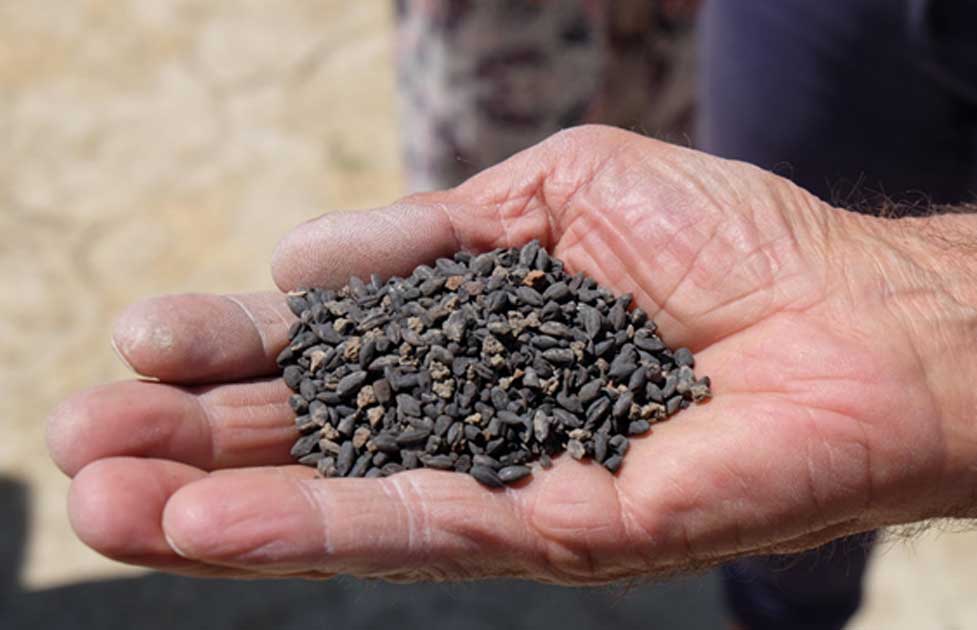2,800-Year-Old Seeds Retrieved from Ancient Castle in Turkey to be Brought Back to Life
In 2014, archaeologists discovered ceramic containers used for cereal storage dating back 2,800 years in Cuvustepe Castle in Turkey. Incredibly, some preserved sesame and wheat seeds remained inside some of the containers and these are set to be revived, bringing to life a slice of Turkey’s ancient past.
Hurriyet Daily News reports that the seeds were found inside three vessels known as pithos, which were used to store and preserve the annual harvests of cereals. The jars were even labelled with their contents.
“In the storages, that are made up of two parts and were reinforced after fires, we have found 120 pithos containers, where cereals, sesame oil, wine and other food were kept,” Van Yüzüncü Yıl University Archaeology Department Professor Rafet Çavuşoğlu told Hurriyet Daily News. “The containers had a capacity of 36 tons of products. Each pithos has a capacity of 300 kilograms. Buried underground, the pithos storages has units of measure written in cuneiform. Cereals obtained from the Gürpınar Plain were kept there. They were used as granaries and met the needs of the people living there. The Urartian kept all of their supplies there to meet the needs of officials in the palace.”
Çavuştepe Castle was built in the 8 th century BC by Uratian King Sarduri II on a ridge of rock overlooking the Gürpınar plain in Van Province. Much of the fortress and palace survived over the millennia including cisterns, walls, temples, and palace structures.

Pithos storage vessels at Çavuştepe Castle used to store cereals (Hurriyet Daily News)
The seeds from Çavuştepe Castle will now be analysed in a laboratory and attempts will be made to regenerate them.
In recent years, a number of ancient seeds have been successfully brought back to life. Last year, some Native Americans found squash seeds in a pot about 800-years-old and revived the plant for the first time in centuries. The seeds from the large, bright orange squash have been distributed to native communities and to others, including some college students in Canada who grew a big, orange squash this fall.

The squash in this photo had not been grown for hundreds of years. Native Americans revived it after finding seeds in a pot 800 years old. (Mother News Network photo)
In 1963, the late archeologist Yigael Yadin unearthed a small stockpile of seeds stowed in a clay jar dating back 2,000 years buried beneath rubble in the mountaintop fortress of Masada in Israel. The seeds belonged to the Judean Date Palm species, which had been a staple crop in the Kingdom of Judea for thousands of years but became extinct by 500AD after the Romans wiped out the date palms in an attempt to cripple the Jewish economy. But then in 2005, botanical researcher Elaine Solowey, director of the Arava Institute for Environmental Studies at Kibbutz Ketura in Israel, decided to plant one and see if anything would sprout. It did, and the male date palm tree named Methuselah, the only one of its kind, produced its first flowers in 2011.

The resurrected Judean date palm in Israel. (Wikimedia Commons)
Since then, Solowey has managed to sprout a small handful of other date palms from ancient seeds recovered at archaeological sites around the Dead Sea, and at least two of them are female. She now hopes she will be able to reproduce the plants and grow an entire date grove.
Top image: 2,800-year-old sounds found in an ancient castle in Turkey (Credit: Oguzhan Ozgur)




















Comments
The university came out and has stated the story of the 800 year old squash is false. They were to grow some old squash but it isn't the large variety everyone has passed around the internet.
http://mennoworld.org/2015/11/23/feature/cmu-squashes-false-tale-with-st...